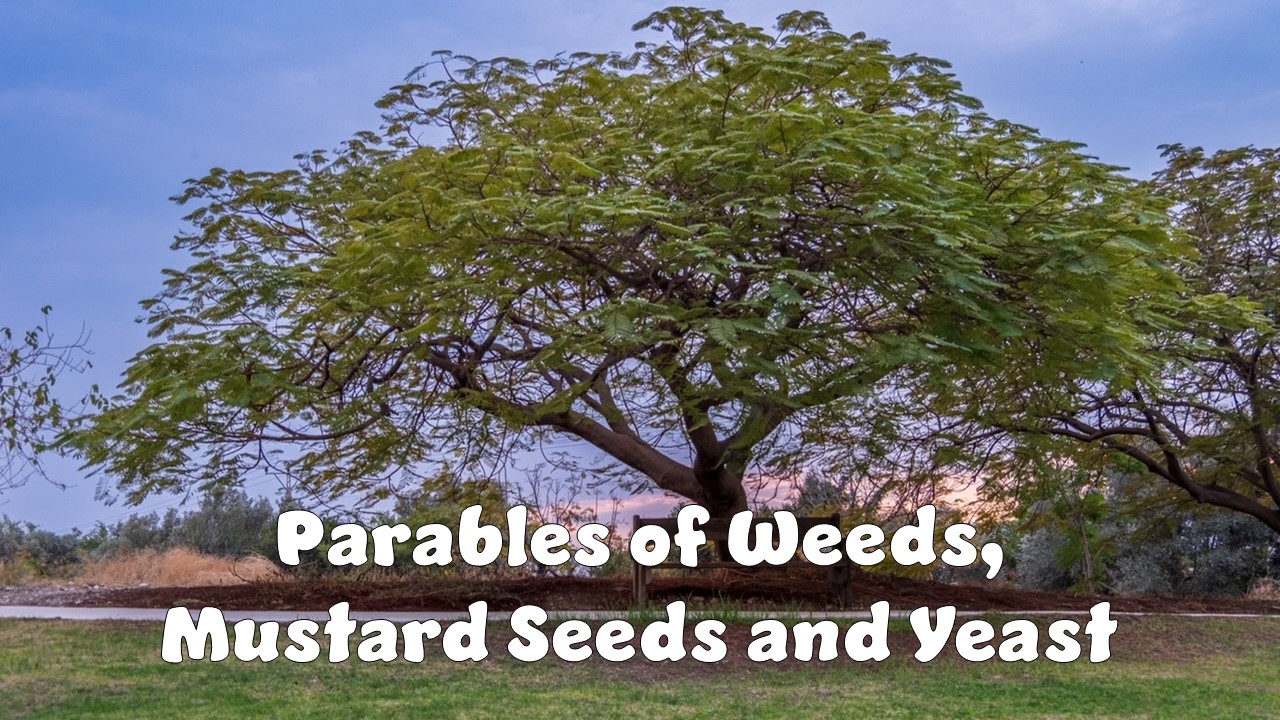
Following on from the Parable of the Sower last week there are three smaller parables with the same theme of the Kingdom of Heaven. Parables have many layers and are not to be taken literally. They are lessons for reflection, not lectures of facts. Jesus would have told these parables many times to many people. He bases them in the daily activities of life so as to reach all peoples. On the banks of the Sea of Galilee is the Cove of the parables and, even today, you can clearly imagine Jesus on a small fishing boat, just out from shore, talking to possibly thousands standing and sitting on the sloping shore. The shape forms a natural amphitheatre to spread His spoken word, as if using a microphone, for all to hear. Weeds of darnel, a tiny seed and yeast are the mundane, everyday things he uses to teach people and help them to understand and believe in his message of mission.
.jpg)
Initially the story of weeds, or ‘evil’ amongst the wheat, or ‘good’, leaves a negative connotation perhaps alluding to the evil that permeates the world today. It is however about the good that still flourishes, and will ultimately triumph, over trials and struggles. When darnel first sprouts, it is almost impossible to distinguish it from the wheat until closer to harvest time. If pulled out too early much of the good crop would be lost with it. In our own lives we see good that wouldn’t have existed without struggle. Often in the face of adversity good deeds are witnessed and bring hope to those struggling. The recent pandemic and the lockdowns that ensued showed us exactly that. From the rainbows drawn on footpaths to brighten the day of people’s limited walks within the confines of their local street, to those who brought food and goods to doorways of the elderly and waved, smiled and sent messages to them through their windows. Bad things can show the path to good. The Kingdom of Heaven can be found in this world right now if you are willing to look. The parable closes by explaining the harvest at the end of the world where God will decide the fate of the ‘wheat’ and the ‘weeds’. We are however reminded in the Psalm before the Gospel that the Lord is good and forgiving, a God of justice if we are open to receive his mercy.
The next two parables are much shorter but still have a message for us all. ‘From little things, big things grow’ is the basic message of the mustard seed parable (and in the words made famous by Paul Kelly’s song which you are probably singing in your head right now.) The mustard seed reminds us that great things can come from small beginnings. In reality the mustard seed isn’t the smallest of seeds nor a plant that grows into the largest of trees but it has symbolic meaning. Mustard has been used throughout history for it’s medicinal purposes by people like Hippocrates and is recognised for its therapeutical value for relief from muscular pain and respiratory disorders to name just a few. It is also a small seed that grows purposefully and vibrantly into a plant that offers protection if it is sought. Each autumn about 500 million birds fly over Israel and the Sea of Galilee from the northern hemisphire in order to spend the winter months in Africa. The branches of a tree would offer these birds the chance to rest. Birds of all kinds and from all parts of the world, seeking respite in the same tree. This small seed and its tree represent the growth of the Kingdom in the heart, the church, and the global community.
.jpg)
How do we know the kingdom is here when we can’t see it? Well just like the yeast mixed in with the flour in our third parable is there, working, unseen amongst the flour to bring about a change, a growth so too is the Kingdom. The flour is transformed to something more desirable and nourishing. Even though the presence of God is unseen it imbues all creation and brings about change both outward and inwardly. The woman of the story mixes the yeast into three measures of flour. This is a large amount of flour and would produce enough bread to feed the hungry 5000 on the mountain grass. The produce of a single mustard plant and a small amount of yeast in flour can provide for many, so too can the Kingdom come to full bloom and expand throughout the world. This is a kingdom that grows from Jesus’ works and preachings.
Lucky for us in this reading Jesus explains the meaning behind his first parable of the weeds and we are reassured that even his disciples didn’t fully understand what they heard. His explanation helps to better interpret the mustard seed and the yeast, and perhaps helps to interpret future parables. We are reminded throughout the bible that reading and meditating on the scriptures is important. The bible records memories and give us an insight into Christ’s mission while he walked among us. Take time to read and reflect on this collection of documents of faith and religion to increase your understanding and strengthen your belief in Jesus Christ and his message of love and pass it on. It is our mission to plant mustard seeds wherever we go. “I will open my mouth to speak in parables; I will proclaim what has been hidden from the foundation of the world.”
‘Let anyone with ears listen!’
.jpg)